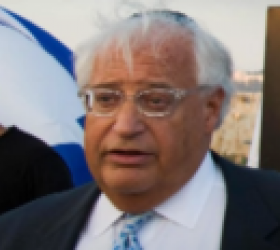Even before he enters office, Donald Trump’s tell-it-like-it-is team is doing a lot of straight talking. Especially on the Israeli-Palestinian issue, hallelujah.
Some are dismayed but it truly is a reason to give thanks. If, as someone very wise once said, the great task in life is to find reality, Trump is to be saluted for helping us along. His nomination of David Friedman as US envoy to Israel ends the fervent pretence that the United States is an honest broker between Israelis and Palestinians.
It has not really been at least since the 1960s when the United States started to help Israel gain a qualitative military edge over its neighbours with the sale of Hawk antiaircraft missiles and Phantom jets and by providing tanks and other goodies.
It is Friedman, a 57-year-old bankruptcy lawyer, however, who has put paid to the honest broker fiction with the very first statement of his designated assignment for which he must be confirmed by the US Senate. After expressing the anodyne desire to “strengthen the bond between our two countries and advance the cause of peace within the region”, he declared that he looked “forward to doing this from the US embassy in Israel’s eternal capital, Jerusalem”.
In that sentence, the US ambassador-select to Israel appeared to be reprising his boss. In March, Trump said much the same thing to the American Israel Public Affairs Committee, except that he described Jerusalem as “the eternal capital of the Jewish people”.
Friedman had previously laid out his position on the Israeli- Palestinian conflict. In an interview with the liberal Israeli newspaper Haaretz in June, Friedman offered bellicose support for Israeli “annexation of parts of the West Bank” and for the vigorous building of settlements in Palestinian territory.
He modestly refused to prescribe an independent Palestinian state. Trump, he said, does not believe it is “an American imperative”, adding that “no one really knows how many Palestinians live there” and Israel should be left to make such decisions it saw fit.
So now we know where the incoming American administration stands on Israel and the Palestinian territories. Those who believe in justice, fair play and the Palestinians’ right to self-determination are appalled. So, too, are those who believe that such deliberately provocative statements are ultimately not in Israel’s security interests. Moderate Israelis at home and liberal Jews in the United States are anxious. The Palestinians are angry. The Arab world is watchful.
Israeli Ambassador to the United States Ron Dermer, who is considered to be very close to Israeli Prime Minister Binyamin Netanyahu, said the embassy move would be “a great step forward toward peace”.
This is as good a time as any for the world to see the reality of the self-proclaimed honest broker hoax.
Successive American administrations have supported Palestinian self-determination with all the eloquence at their command, even as they undermined it in the United Nations and bolstered the most indefensible of Israeli positions with large and unconditional amounts of monetary, military and moral support. The United States has consistently obstructed the Palestinian territories’ attempt to gain UN member status. In December 2014, the United States rejected a UN Security Council proposal to recognise Palestine as a state along the 1967 borders.
That was only the most recent of a long list of vetoes by the United States on UN resolutions of varying tone on the plight of the Palestinians. Some resolutions were fairly bland statements of concern; others were more urgent about aid for Palestinian refugees and a few were censorious about Israeli military incursions. With each negative vote at the United Nations, the Americans were saying what Friedman and Trump now unambiguously have said in bald and undiplomatic terms.
Undiplomatic because moving the US embassy to Jerusalem, thereby recognising a disputed city as a country’s capital, is an exceptionally reckless and foolhardy move. Other aspiring American presidents — George W. Bush and Bill Clinton — promised the same on the campaign trail. That position lines up with the US Congress’s 1995 Jerusalem Embassy Act, which required the embassy to move by a long-gone date (December 1999) and for the city to be recognised as Israel’s capital.
No one actually set the transfer in motion, judging it too inflammatory and possibly too blatantly unfair even for a faux honest broker.
In early December, US President Barack Obama signed the regular six-month waiver that suspends the act and keeps the US embassy in Tel Aviv. In June, that will go the way of all mortal things. Then, it will be up to Trump-Friedman. They will have a symbolically important moment to effect their desired change.
Next year is the 50th anniversary of Israel’s capture of the whole of Jerusalem. It will be suitably dramatic if Trump, a reality TV star, and his lieutenant in Israel help complete Israel’s conquest.





